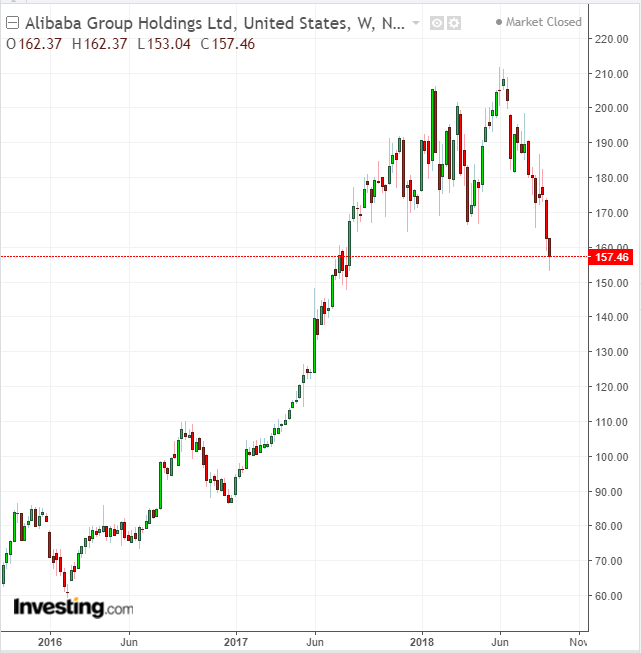Alibaba's (NYSE:BABA) technical chart looks downright ugly, and it comes at a time when some of its fundamentals aren't looking too good either. Founder Jack Ma has announced he will hand over the reins as chairman to current CEO Daniel Zhang within a year.
The Chinese e-commerce giant has lost about a quarter of its value since reaching a record high in June. This massive plunge has thrown the long-term bull case into doubt for a company that controls 58% of the Chinese e-commerce market.

There are many triggers for this sudden downfall. The most important one, which is not specific to Alibaba, is the escalating trade war between China and the US, the world’s two largest economies. Many investors fear President Donald Trump’s trade tariffs on Chinese imports will hurt the Chinese economy badly.
In the latest development, Trump has threatened to impose tariffs on an additional $467 billion worth of imports from China, after tit-for-tat $100 billion duties that both countries announced this summer. If the president follows through, the threatened tariffs and those already in place would more than cover the $505 billion of Chinese products the US imported in 2017. Due to the colossal nature of these measures, investors are currently shunning Chinese stocks. The Shanghai Composite index is currently in a bear market, down about 26% from its 52-week high.
Beyond trade tensions, Chinese internet stocks are also facing a tough operating environment locally. Regulators’ crackdown on social media, streaming video and online gaming have weighed on the nation’s largest internet stocks. Tencent Holdings (OTC:TCEHY) for example, the Chinese equivalent of Facebook (NASDAQ:FB), is down more than 20% this year.
Earnings Momentum Slowing
Alibaba stock, however, also has a couple of other problems that are making investors nervous. To begin with, its earnings momentum seems to be slowing down, pressured by heavy investments the company is making to build scale in Southeast Asia, a region that’s central to its global growth.
In its fiscal first quarter report on August 23, Alibaba reported earnings that fell short of analysts’ expectations, while operating margins came under pressure on escalating costs. Net income declined 40.8% from the fiscal first quarter of 2017, while adjusted earnings per share came in at 8.04 yuan vs. 8.15 yuan expected.
Operating profit took a big hit, dropping 54% to 8 billion yuan ($1.16 billion). Alibaba cited the cost of share-based compensation at its affiliate company Ant Financial (formerly Alipay), which it said increased by 11 billion yuan for the period. If not for that expense, operating income would have climbed 9%, it said.
According to Alibaba’s guidance during its earnings release, the pressure on operating margins will continue:
"As many of our newly developed and acquired businesses have different cost structures, we expect that our margin will continue to be negatively impacted by these businesses and the accounting treatment of revenue recorded on a gross basis."
On the brighter side, Alibaba's sales surged 61% in the quarter, helped by its new growth drivers, such as cloud computing and entertainment. But on its bottom line, these businesses played a big role in the margin compression. These divisions lost money a year ago and they lost even more money in the latest quarter, with little sign that significant revenue growth is translating into improved profitability.
Bottom Line
The near-term future of the stock depends on the resolution of trade disputes and how quickly both countries involved are able to strike a deal. Over the long run, however, we remain bullish on Alibaba. It provides unique exposure to the world’s second-largest economy as well as Asia’s other emerging markets.
The consensus in the market is that Alibaba shares will rebound once the geopolitical issues are resolved and Chinese stocks began to once again trade on their actual fundamentals. The majority of analysts on Wall Street have a buy rating on Alibaba, with an average $230.35 price target, implying about a 32% upside potential from yesterday's $157 close.
Regardless of the short term targets, we believe Alibaba is the sort of stock buy-and-hold investors could consider on every dip.
